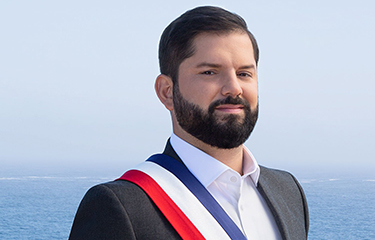Chile will look to replace its existing fishing laws, while also strengthen environmental stewardship in the ocean, Chilean President Gabriel Boric, who took office in March 2022, said in his first address to the nation on 1 June, 2022.
“In terms of fisheries and aquaculture, we will fulfill our commitment to advance in a new law, which will be free of corruption and the result of an open and transparent debate. One that delivers clear, fair, and sustainable rules, both at an industrial and artisanal level,” Boric said during a televised speech from Chile’s Congress.
The president was referring to the controversial fishing law, enacted in 2013 that gave four large-scale private fisheries control of 92 percent of Chile’s marine resources – much to the consternation of small-scale, artisanal fisherman along the country’s expansive 2,600-mile coastline.
The law set quotas in a move to address overfishing, which at the time was an issue negativley affecting horse mackerel populations. However, in a situation commonly referred to as the “Corpesca case,” named after one of the four large companies that benefitted from the fishing law, a number of parliamentarians were accused of accepting bribes to influence the writing of the bill to favor the larger seafood firms. The CEO of Corpesca at the time, Francisco Mujica, was brought up on charges for bribery and repeated tax crimes. The event marked the first oral trial held in Chile for illegal financing of politics.
Boric said his administration will implement a national strategy of public integrity that will strengthen prevention of conflicts, while also proposing bills to regulate lobbying and conflicts of interest in public functions.
“We will reformulate the policy to promote artisanal fishing and small-scale aquaculture, improving the instruments of support provided by the National Institute for the Sustainable Development of Artisanal Fishing and Small-Scale Aquaculture. Chile is in debt to the citizens of the sea. In accordance with the importance of this sector, it is time for the state to be able to develop policies which stimulate this activity preferably destined for human consumption, advancing food sovereignty and security,” Boric said. Planned initiatives include building 17 new fishing coves, to the benefit of more than 10,000 artisanal fishers.
Boric said that the country needs to move toward more sustainable aquaculture practices that integrate economic benefits and inclusive development through the creation of local jobs, with a long-term approach.
“For this, we must guarantee the highest standard of protection of the environment in which they are located. We cannot continue depredating the sea floor … We do not want to have more disasters as we have seen.”
Boric – at 36 years old, the youngest president in Chile's history – has previously questioned the environmental sustainability of the country’s USD 5.2 billion (EUR 4.6 billion) salmon-farming industry. Hailing from Chile’s southernmost region of Magallanes, where the salmon-farming sector has been expanding its reach, Boric said he is considering a moratorium on the farmed salmon sector that would halt its expansion in the country.
Clearer rules for the aquaculture industry will provide legal certainty for investment, and certainty about the fulfillment of the objectives of preservation and protection of ecosystems, especially those that make up protected areas, he said in his speech.
Regarding protected areas, Boric said that his administration will celebrate co-management agreements with indigenous communities for protection and conservation of areas of environmental, heritage, and scientific interest – specifically naming an agreement he expects to sign this year for the Kawésqar National Park. The latter was recently the subject of a new National Geographic documentary which advocated for the protection of a large portion of Chile's coastline from further commercial salmon-farming development.
Boric praised the country’s signing of the Escazú Agreement - a regional agreement on access to information, public participation, and justice in environmental matters in Latin America and the Caribbean – which the administration of his predecessor, Sebastián Piñera, had refused to sign. Boric said the move demonstrates Chile’s commitment to resume the Latin American leadership that it has had in environmental matters.
“Soon, at the Summit of the Americas, together with Canada, we will lead an agreement proposal for the creation of protected marine corridors throughout the Pacific Ocean,” he said. “Our foreign policy will be turquoise, that is, with a ‘green’ focus on protecting biodiversity, and a ‘blue’ focus on protecting the oceans. Through it we will promote international cooperation and multilateralism from the global south, with an ecological perspective.”
To fund the programs his administration is proposing, Boric said his administration will submit a tax reform proposal that “will seek to generate more resources to meet our commitments to the country as well as structure a fairer and more-transparent tax system.”
The reform “will attack the bases of inequality, taxing high incomes and assets, mining income and [closing] legal loopholes to finance the fulfillment of social rights in health, pensions and care,” he said.
Photo courtesy of the Chilean government.







